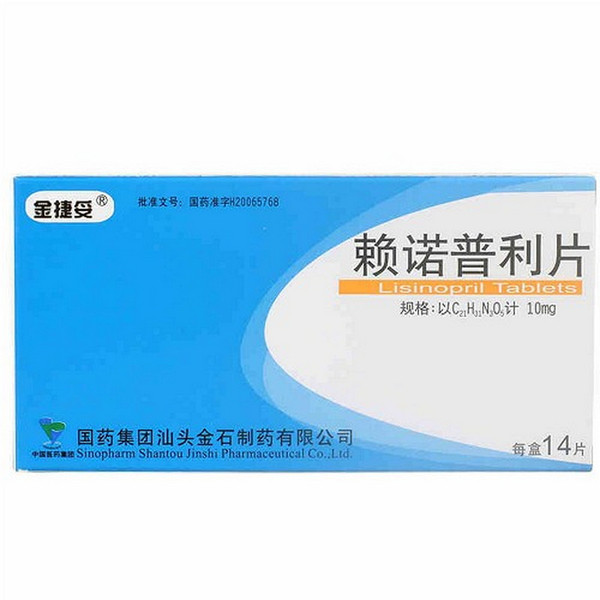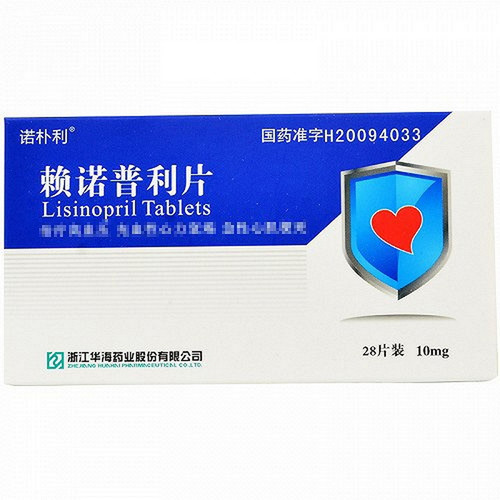Product Overview
[Drug Name]
Generic Name: Lisinopril Tablets
Trade Name: JinJieTuo Lisinopril Tablets 10mg*14 Tablets
Pinyin Full Code: JinJieTuo LaiNuoPuLiPian10mg*14s
[Main Ingredients]
Main Ingredient: Lisinopril.
[Properties]
This product is a white or off-white tablet.
[Indications/Main Functions]
Hypertension: This product is used to treat essential hypertension and renovascular hypertension. It can be taken alone or in combination with other antihypertensive drugs. Congestive Heart Failure: This product can be used in combination with digitalis or diuretics as an adjunctive treatment for congestive heart failure. Acute Myocardial Infarction: This product is used to treat patients with hemodynamic stability within 24 hours after an acute myocardial infarction. It can prevent the development of left ventricular dysfunction or heart failure and improve survival. Patients should receive routine recommended treatments such as antithrombotic agents, aspirin, and beta-blockers, if appropriate.
[Precautions]
1. Patients taking diuretics or with heart failure, dehydration, or sodium depletion are extremely sensitive to this product and should start with a low dose to avoid hypotension. 2. Patients with renal failure should reduce the dose or extend the duration of administration. 3. During use, white blood cell counts and urine routine tests should be performed regularly. For patients with renal impairment, serum potassium, blood urea nitrogen, and creatinine should be measured. 4. This product must be used under the guidance of a physician.
[Drug Interactions]
This product is contraindicated in patients with allergies to any component of this product, those with a history of angioedema caused by ACE inhibitors, or those with hereditary or idiopathic angioedema.
[Pediatric Use]
The safety and efficacy of this product have not been established in children.
[Elderly Use]
Please refer to the [Dosage and Administration] section.
[Pregnant and Lactating Women Use]
This product is generally not used in pregnant or lactating women.
[Specifications]
10mg*14 tablets
[Dosage and Administration]
Because absorption of this product is not affected by food, it can be taken before, during, or after meals. This product should be taken orally once daily. For other details, see the package insert.
[Adverse Reactions]
General and application site reactions: Uncommon: Fatigue, weakness. Laboratory findings: Uncommon: Elevated blood urea enzymes, increased serum creatinine, increased liver enzymes, hyperkalemia. Rare: Elevated serum bilirubin, hyponatremia.
[Contraindications]
This product is contraindicated in patients with allergies to any component of this product, those with a history of angioedema caused by ACE inhibitors, or those with hereditary or idiopathic angioedema.
[Overdose]
Symptoms of overdose may include severe hypotension, electrolyte imbalance, and renal failure. Following an overdose, patients should be closely monitored. Treatment should be tailored to the nature and severity of symptoms. Measures to inhibit absorption and accelerate excretion should be employed. If severe hypotension develops, the patient may be in shock and should be promptly administered intravenous saline. If possible, treatment with angiotensin II may be considered. Angiotensin-converting enzyme inhibitors can be removed by hemodialysis. High-flux polyacrylonitrile dialysis membranes should be avoided. Serum electrolytes and creatinine should be monitored frequently.
[Pharmacology and Toxicology]
Lisinopril is a peptide dipeptidase inhibitor. It inhibits angiotensin-converting enzyme (ACE), which catalyzes the conversion of angiotensin I to the vasoconstrictor peptide angiotensin II. Angiotensin II stimulates the adrenal cortex to secrete aldosterone. ACE inhibition reduces angiotensin II concentrations, thereby decreasing the pressor effect and aldosterone secretion. This decrease in aldosterone leads to an increase in serum potassium. Lisinopril lowers blood pressure primarily by inhibiting the renin-angiotensin-aldosterone system. It also has antihypertensive effects in patients with low-renin hypertension. ACE and kininase II are the same enzymes that degrade bradykinin, but whether increased bradykinin (a vasodilator peptide) levels in the blood contribute to lisinopril's antihypertensive effect remains to be elucidated.
[Pharmacokinetics]
Lisinopril is an orally active, thiol-free ACE inhibitor.








